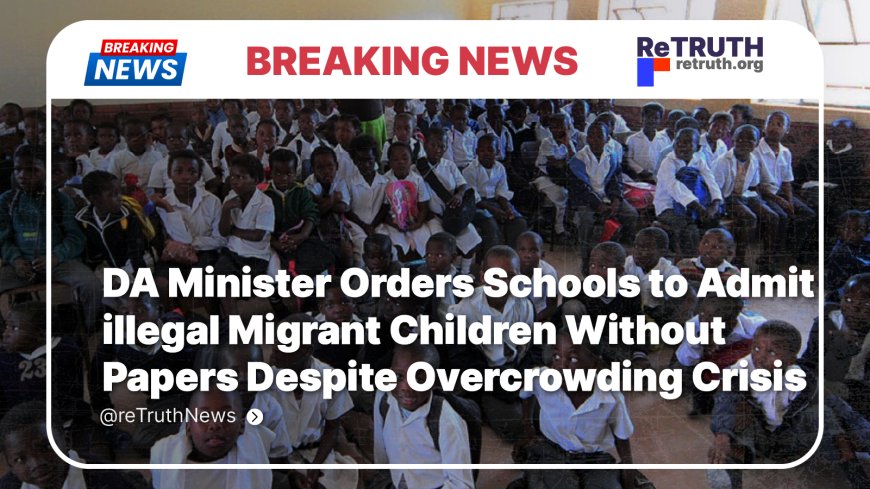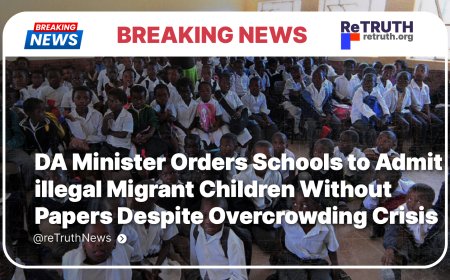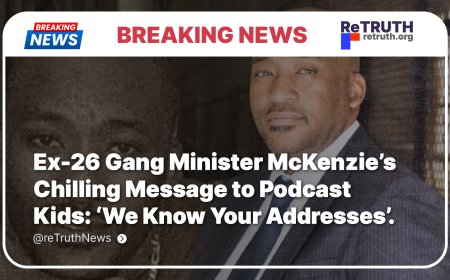DA Minister Orders Schools to Admit Illegal Migrant Children Without Papers Despite Overcrowding Crisis
DA Minister Orders Schools to Admit Illegal Migrant Children Without Papers Despite Overcrowding Crisis

Breaking News: Education Minister Orders Schools to Enrol Undocumented Migrant Children Despite Overcrowding Concerns
Johannesburg, 15 October 2025 In a sweeping directive that has ignited fresh debate in South Africa, the Minister of Basic Education, Siviwe Gwarube, has mandated that all public schools accept children without proper immigration or identity papers, irrespective of capacity constraints. The move, aimed at upholding the constitutional right to basic education for all children, has drawn praise from rights groups but fierce backlash from communities already grappling with overcrowded classrooms and resource shortfalls.
What the Announcement Says
Under new regulations being framed by the ministry, principals and district education offices can no longer refuse admission to undocumented learners on the basis of lacking identification. Instead, parents or guardians must submit a sworn affidavit explaining the absence of documents, and the child must be allowed to attend school while efforts are made to regularize their status.
According to the published rules, within seven days of admission, the principal must notify the district education office of the undocumented learner. The head of the provincial education department is expected to assist parents or guardians in liaising with the Department of Home Affairs, with the aim of helping the child get documented.
Gwarube has also warned that schools must not become arenas for political protests over migration and called on civil society groups to refrain from pressuring schools to exclude “illegal” children.
Constitutional and Legal Basis
Proponents of the policy point to landmark court rulings and the country’s constitutional provisions as backing the minister’s stance:
-
The Phakamisa judgment affirmed that all children regardless of immigration status have the right to basic education under Section 29(1)(a) of the Constitution.
-
In a prior ruling, clauses in the Department of Basic Education’s admission policy that excluded undocumented learners were struck down as unconstitutional.
-
More recently, the Basic Education Laws Amendment (BELA) Act, 2024 introduced changes to the South African Schools Act, including provisions to strengthen the admission rights of learners, regardless of documentation status.
-
Thus, the minister contends she is not creating a new entitlement but enforcing legal and constitutional obligations already in place.
Reactions and Backlash
The announcement has unleashed sharp criticisms, particularly from parents, school governing bodies, and local politicians, who warn that classrooms are already bursting at the seams and that infrastructure, staffing, and resources are entirely inadequate. Some fear that admitting undocumented children could degrade the quality of education and widen existing inequities.
Operation Dudula and similar anti-immigration groups have escalated calls to block undocumented children from schools, claiming that South African children must be given preference. Legal advocacy groups, including Equal Education and the Equal Education Law Centre, have fought back strongly, asserting that exclusion is unlawful and discriminatory.
In response to past protests, Minister Gwarube has cautioned that schools should remain safe, neutral spaces and not be drawn into migration politics.
Challenges & Implications
While the policy is legally defensible, its practical rollout presents serious hurdles:
-
Many schools are already overcrowded, with teacher-to-learner ratios far exceeding targets.
-
The influx of additional learners may strain infrastructure classrooms, sanitation, transport, and learning materials.
-
Funding allocation and staffing would need urgent revisiting to avoid deteriorating education standards.
-
Some schools in under-resourced districts may struggle financially to absorb additional pupils whose enrolment may not immediately come with additional funding.
-
Social tensions may intensify in communities where resources are stretched thin and public sentiment is polarized over migration
What’s Next
The regulations are currently open for public comment before they are finalized and gazetted. Schools will be expected to comply with the new rules, and district offices must adapt admission processes. Monitoring and enforcement will be key to ensuring that the directive is implemented equitably across provinces.
In the coming weeks, expect legal challenges, protests at school gates, and heated debates in parliament. The government will be under pressure to balance its constitutional obligations with practical realities on the ground.
What's Your Reaction?
 Like
0
Like
0
 Dislike
0
Dislike
0
 Love
0
Love
0
 Funny
0
Funny
0
 Angry
0
Angry
0
 Sad
0
Sad
0
 Wow
0
Wow
0


























